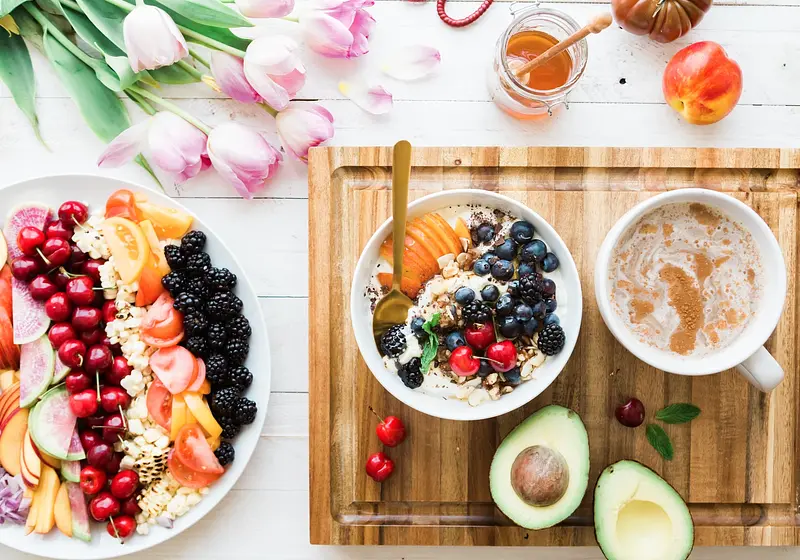If you're on TikTok, you've heard of the idea of "that girl." "That girl" is the modern day's it girl: drinks green juice, goes to soulcycle, eats like Emily Mariko, wears OnCloud sneakers and Aritzia sweatsuits. In fact, the "that girl" aesthetic isn't necessarily damaging; it focuses on making the most of your day, staying organized, and doing things that build you up. But the "that girl" falls into the same downfalls of a lot of other social media phenomena: it perpetuates harmful beauty standards, and reinforces a dichotomy between foods that establish some as "good" and others as "bad."
@kaylieestewart morning and night routine ☀️🌙 #thatgirl #motivation #healthylifestyle #fyp ♬ ummmm - eshy poo🤵🏻🤞🏻
If you're like literally most of the American population, your new year's resolution was probably along the lines of "eat healthier," "lose weight," or "get fit." That's not rare in the modern day: due to the rise of social media and consumption of ads that promote miracle weight-loss teas and easy-one-week remedies to stomach fat, losing weight seems easy with the help of online consultants and random mineral supplements.
The rise of diet culture, however, doesn't center on intuitive eating, getting your body's necessary nutrients, or even working out to keep yourself strong and healthy. Instead, diet culture relies on the propagation of "fad diets" and unattainable beauty ideals fostered by social media outlets that prompt unhealthy eating habits and have dangerous effects on self-esteem.
What is Diet Culture, and Why is it Harmful?
Diet culture refers to a set of socially constructed norms fed to populations that insist, in order to be healthy, people can only look a certain way, eat certain foods, and only consume a certain number of calories. While obesity is a large problem in the United States and can contribute to health issues over time, diet culture takes that a step further, postulating that in order to be healthy you have to be stick thin.
The rise of diet culture in combination with social media has contributed significantly to the rise of dangerous eating disorders in adolescents. Eating disorders such as bulimia and anorexia nervosa rank as the third most common chronic illness in adolescent females, with an incidence of up to 5%.
Diet culture is exacerbated by social media influencers and celebrities that boast their $300 juice cleanse in their instagram stories and swearing that that's what helps them keep their model body-- when in fact, some of these cleanses actually wreck your body.
Take a juice cleanse, which lasts from 1-10 days and asks participants to indulge in a diet void of many nutrients, like protein, fats, carbs, and fiber, and replaces food with a liquid-only diet. Even if you're doing a juice cleanse for weight loss, your body can't burn off fat that quickly; instead, you're burning off water weight and muscle, not fat.
Diet culture and beauty standards also restrict intuitive eating tendencies, which causes the body to go into "survival mode", which makes you weaker, more tired, and unable to focus. There are equally as many health downsides to a restrictive and non-nutritious diet than there is to severe obesity.
Internalized weight stigma is an extremely common issue, especially among young females, across the United States and internationally. The development of unhealthy eating behaviors is linked to poor cardiometabolic health, and there isn't enough research for there to be established intervention techniques.
Diet culture is a silent culprit of fostering these unhealthy ideals, functioning under the guise of "health"; but, it notably distracts from the fact that thinness and health are not necessarily synonymous.
How do I Tune Out Fad Diets?
Dieticians and nutritionists opposed to fad diets instead advocate for the practice of intuitive eating: listening to the body's innate signals and allowing the body to eat what it's craving, when it's craving it.
By doing this, you counteract diet culture's insinuations that there are "good foods" and "bad foods"; obviously, eating a Big Mac every day isn't necessarily healthy, but focusing on foods that make you feel good and maintaining a balance in what you consume can help develop healthy eating standards without succumbing to toxic model diets. By removing restrictive food rules from your practice, you can eat whatever you want; chips, salad, fries, and fruits.
Instead of micromanaging your calorie intake, ensure you're consuming the necessary nutrients. Intuitive eating, while there's been limited studies, shows promising health benefits in individuals, including lowering the ever-prominent (and increasingly arbitrary) BMI.
When you work out, work out to keep healthy. Working out isn't just to get that 6-pack that Kendall Jenner has; it has benefits for overall health, focus, and intelligence. Forming healthy habits and removing the "I need to be skinny" aspect of consumption and self-health redefines society's understanding of what is beautiful and what is good for you, and ultimately makes you feel better.
Establishing an introspective approach to mindful eating and exercise is a much better resolution than simply, "lose weight."
This year, I encourage you not to fall victim to juice cleanses, "cure-all" powders, and spot-decreasing exercises, and instead to practice habits that make you feel healthy. It's easy to feel inactive, especially in quarantine and when many colleges and schools returned to Zoom. That's understandable. But finding balance, that's much better for you in the long run.




